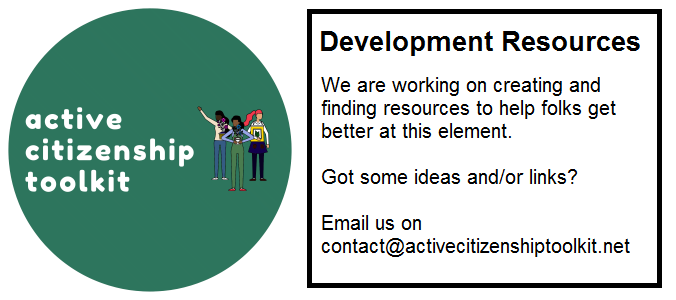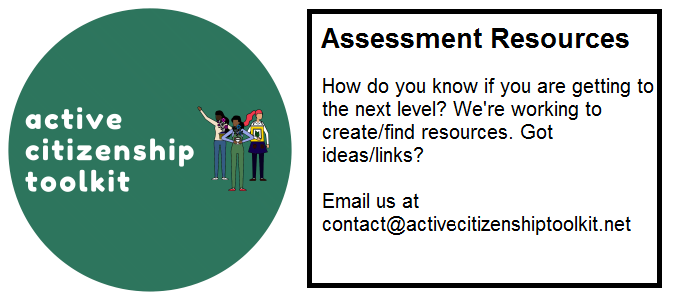Element Descriptor
Old hands/regular members of social movement organisations massively underestimate how much emotional effort goes into turning up to a meeting full of people you don’t know, especially if they don’t look like you. If groups don’t have a way of making meetings welcoming (but not overdoing it, obvs), chances are the new folks will not come back. #epicfail
Level descriptors
| Novice | Practitioner | Expert | Ninja |
|---|---|---|---|
| With time for preparation, and with support, you can welcome one or two people who are clearly keen and excited to be there, and who have some basic questions about how things work. | You can welcome small groups of people, some of whom are keen to attend, others who have been coerced by their friends, answering both obvious and odd questions, without freaking anyone out or eating into the time of the actual meeting. | You can welcome diverse individuals from a range of cultures/assumptions, who have little or no knowledge of the group, and are quite skeptical/have been dragged there forcibly, giving them the right information, in the right formats, so they feel orientated and can understand what is going on. | On a moment’s notice you can help large groups of diverse individuals to figure out what is about to go on at a relatively complicated and ambiguous meeting, fielding awkward and even hostile questions, with concise, clear, factual answers that leave everyone on the right page(s). |
Element Overview Essay
This is a draft. If something doesn’t make sense, or you see typos, or if you have further ideas, please email us on contact@activecitizenshiptoolkit.net
And one reason for this not being done well kind of in the title people are afraid that if they overdo it, they’ll seem phoney, American, inauthentic, needy culty.
And underneath that, or alongside that is a possibly a reticence about talking to new people about having to answer their questions about not having social skills to put people at ease. And why should I have to do this? Nobody did this for me.
And, well, “if I’m having to do newbie duties, I’m not getting to hang out with my mates, which is the whole point, really, of going to a meeting?” Oh, no, no, we’re here for the revolution. Yeah, of course you are comrade.
So the consequences of doing it badly/not at all are – and I can speak from personal experience – is the new people who have come to your meeting feel If you do it over-enthusiastically, they’re going to be freaked out that you’re a cult. And if you don’t do it at all, which happens a lot, they’re going to be like “well, nobody cares about why I’ve come, who I am, what skills I have, I’m not going to come back.”
And when I was in Australia in 2011, I felt that really strongly that decruitment because in Manchester, at least, I had gone to meetings and I’d seen familiar faces and I’ve at least been acknowledged, even if not enthusiastically, approached on all occasions, whereas in Australia, wow, you really knew what it was like to go into a room where you didn’t know anyone and nobody seemed interested.
Okay, so the fix for this is that you discuss it as a team, what level of welcome do you need? Are there ways that you can put a lot of the material that you would want to get across to people online, either as a blog post or you know, as a video, a two minute video with the narrated by people who are likely to be at the online or face to face meeting, so that a newbie can put some names to faces before they even attend for the first time?
Can you rotate it so nobody gets stuck with it forever. And make sure that when people rotate, they pass on any top tips that they have of skills and habits that they’ve developed.
So that there isn’t wheel reinvention while you rotate, you see what I did there? Right?
Development Resources

Assessment Resources

